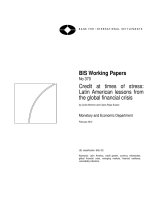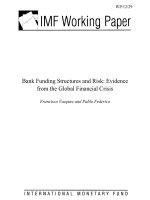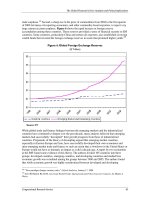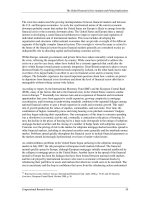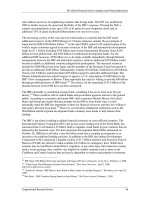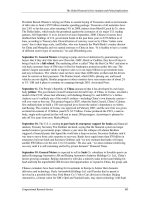Lomfeld et al reshaping markets; economic governance, the global financial crisis and liberal utopia (2016)
Bạn đang xem bản rút gọn của tài liệu. Xem và tải ngay bản đầy đủ của tài liệu tại đây (2.06 MB, 388 trang )
Reshaping Markets
Set against the origins and consequences of the global financial crisis, this
timely book offers an enriching and revealing narrative of the role that the
state plays in regulating markets. Focusing on core areas of private law such
as corporate, labour and banking law, the contributors offer a conceptual
framework in which to examine the central tenets of the role of private law
in today’s global economy. In the current climate of ever-increasing economic
inequality and austerity measures, the authors highlight the urgent need for
a comprehensive analysis of the continuing tension between ideas of market
liberalism and theories of society. With a focus on both the domestic and
transnational dimensions of market governance, the authors offer a crucial
insight into the co-existence and interaction between state and market-based
economic governance.
bertram lomfeld is Professor of Private Law and Legal Philosophy at Free
University of Berlin.
alessandro somma is Professor of Comparative Law at the University of
Ferrara, Italy.
peer zumbansen is the inaugural Professor of Transnational Law at
The Dickson Poon School of Law, King’s College, London, where he directs
the Transnational Law Institute.
Reshaping Markets
Economic Governance, the Global Financial
Crisis and Liberal Utopia
Edited by
Bertram Lomfeld
Professor of Private Law and Legal Philosophy
Free University of Berlin
Alessandro Somma
Professor of Comparative Law
University of Ferrara, Italy
Peer Zumbansen
Professor of Transnational Law
King’s College, London
University Printing House, Cambridge CB2 8BS, United Kingdom
Cambridge University Press is part of the University of Cambridge.
It furthers the University’s mission by disseminating knowledge in the pursuit of
education, learning and research at the highest international levels of excellence.
www.cambridge.org
Information on this title: www.cambridge.org/9781107095908
© Cambridge University Press 2016
This publication is in copyright. Subject to statutory exception
and to the provisions of relevant collective licensing agreements,
no reproduction of any part may take place without the written
permission of Cambridge University Press.
First published 2016
A catalogue record for this publication is available from the British Library
Library of Congress Cataloguing in Publication data
Lomfeld, Bertram, editor. | Somma, Alessandro, editor. | Zumbansen, Peer, 1966–
Reshaping markets : economic governance, the global financial crisis and liberal
utopia / edited by Bertram Lomfeld, Alessandro Somma, Peer Zumbansen.
Cambridge, United Kingdom : Cambridge University Press, 2016.
LCCN 2015047141 | ISBN 9781107095908 (hardback)
LCSH: Law – Economic aspects. | Financial institutions – Law and legislation. |
Trade regulation. | BISAC: LAW / Corporate.
LCC K487.E3 R469 2016 | DDC 343.08–dc23
LC record available at />ISBN 978-1-107-09590-8 Hardback
Cambridge University Press has no responsibility for the persistence or accuracy of
URLs for external or third-party internet websites referred to in this publication,
and does not guarantee that any content on such websites is, or will remain,
accurate or appropriate.
Contents
List of figures
page xi
List of contributors
xii
Introduction: reshaping markets and the question of agency
peer zumbansen
1
Part I Crisis and normality in transnational market regulation
7
1 The central problems of Marx’s economics and the nature of
market regulation
david campbell
1.1
1.2
1.3
1.4
9
Introduction
The meaning of ‘regulation’
Left-wing criticism of the free market
Early British left-wing criticism of the labour theory of value
1.4.1 Shaw and Keynes on Marx
1.4.2 Wicksteed on Marx
The critique of capitalism in light of the labour theory
1.5.1 Supply and demand
1.5.2 Competition
1.5.3 Planning
Conclusion: the form of value
9
10
13
16
16
21
23
23
31
33
36
2 Contract law, securitization and the pre-crisis transformation
of banking
james ‘jay’ varellas iii
45
1.5
1.6
2.1
2.2
2.3
Introduction
Liberal contract law and the development of the securitization market
2.2.1 The historical development of securitization
2.2.2 The laissez-faire institution of contract law
2.2.3 Contract law and the pre-crisis speed-up of securitization markets
Securitization and the rise of market-based banking
2.3.1 Securitization and the eclipse of the post–World War II banking
regime
2.3.2 The rise of market-based banking and its consequences
45
47
47
49
50
52
52
53
v
Contents
vi
Market-based banking and the problem of the “coordinated market
economy”
2.4 Conclusion
2.3.3
3 ‘Inside’ and ‘outside’ the firm: corporate law and contract
governance as regulatory theories
peer zumbansen
3.1
3.2
3.3
3.4
3.5
54
56
60
Introduction
Studying the corporation
The lawyer’s mindset and the new twist in law and economics
The promises (and pitfalls) of contract governance
Coming full circle? The corporation and contract governance
3.5.1 The conundrum of agency in contemporary contract and corporate
theory
3.5.2 Beyond public versus private: the promise of relational contract
theory for a new theory of the firm
3.5.3 The many bases of contracts
3.6 Conclusion
75
78
81
Part II Austerity woes: trials and tribulations of debt
95
4 The Greek crisis: a critical narrative
iannis michos
4.1 Prologue: the biggest sovereign insolvency in history
4.2 Foucault’s ‘tool box’
4.2.1 Crisis and reform
4.2.2 An event and the quest for a single cause
4.2.3 The use of data
4.3 What did really happen?
4.3.1 The years 1990–2005: availability of cheap labour and profit
margins
4.3.2 Greece in the Eurozone: living with a strong currency
4.3.3 Governance issues within Greece and the Eurozone
4.3.4 The ‘inefficient’ markets: eurozone or euro country?
4.4 Epilogue: The shaping of a new paradigm
5 The biopolitics of debt-economy: market order, ascetic and
hedonistic morality
alessandro somma
5.1
5.2
5.3
5.4
5.5
5.6
5.7
Accumulation regimes, hedonism and asceticism
The emerging of a debt-economy
The morality of debt relations as power relations
Sovereign debt restructuring and morality: citizens’ asceticism
The German experience: Hartz-reforms and invisible poverty
Cooperation and workers’ asceticism
From consumers’ hedonism to communitarianism
60
63
66
70
72
73
97
97
99
100
101
101
102
102
105
107
110
112
115
115
117
119
121
124
126
128
Contents
vii
6 Credit contracts and the political economy of debt
moritz renner and andreas leidinger
6.1
6.2
6.3
Introduction
Three stages of a decline? A historical political economy of debt
6.2.1 The social emdeddedness of debt
6.2.2 The Great Transformation Part I: credit contracts and the regulatory
state
6.2.3 The Great Transformation Part II: trading risks
Making risk ‘disappear’: the example of CDS trading
138
Making the law more risk-sensitive: the example of
close-out netting
139
141
142
142
143
144
Internal centralisation – The 2009 Supplement to the
Master Agreement
144
6.3.3.2 External lobbying – the example of close-out netting
Reembedding debt?
145
147
6.3.4.1
Is there a reembedding of debt at all?
147
6.3.4.2
Are ISDA’s standards democratically legitimate?
148
6.3.4.3
Societal regulatory authorities and the nation-state –
a complementary relationship
Conclusion
Part III
135
137
6.2.3.1
6.3.3.1
6.4
133
134
134
6.2.3.2
6.2.3.3 A shift from normative to cognitive expectation structures?
Reembedding debt? The constitution of a political economy beyond the state
6.3.1 ISDA’s development and functioning
6.3.2 ISDA’s part in the cognitivation of financial markets
6.3.3 The evolution of ISDA’s position in the derivatives market
6.3.4
133
Reforming finance: systemic risk and accountability
7 Why manager liability fails at controlling systemic risk
andreas engert
7.1 Introduction
7.2 Manager liability: not strict but fault-based
7.2.1 Strict liability is inconsistent with managers’ role as agents
7.2.2 Incentive distortions from strict liability
7.3 Defining the standard of care
7.3.1 Objective: limiting the probability of bank insolvency
7.3.2 Defining the standard ex ante
7.3.3 Defining the standard ex post
7.4 The consequences of uncertain care standards
7.4.1 The case for restricting manager liability
7.4.2 Objections
7.5 Conclusion
153
154
159
161
161
162
163
164
166
167
169
174
176
177
179
180
viii
Contents
8 How special are they? Targeting systemic risk by regulating
shadow banking
tobias tro¨ ger
8.1 Introduction
8.2 The rationale underpinning current regulatory initiatives to cover non-bank
credit intermediation
8.2.1 In search of an operative definition
8.2.2 Goals of banking regulation revisited: substance
Safeguarding the supply of liquidity as the paramount end
in prudential bank regulation
8.2.2.2 Risk-insensitive funding as the core problem
8.2.3 Synthesising the debates
8.3 Legislators’ and supervisors’ ‘formalist’ implementation of the policy
prescriptions
8.3.1 Securitisation and off-balance sheet conduits
8.3.2 Mutual money market funds and repo
8.4 Enhancing prudential regulation’s assertiveness in a normative approach
8.4.1 The idea of an internal solution without permanent law reform
8.4.2 Actual and alleged limits of a normative approach
8.5 Conclusion
185
185
188
188
191
8.2.2.1
9 Fixing Finance 2.0
john m. conley and cynthia a. williams
9.1 Introduction
9.2 Too big to fail banks are still a concern
9.2.1 Why is “too big to fail” a problem?
9.2.2 Relevant provisions of Dodd-Frank
9.3 Executive compensation
9.4 Why the gaps?
9.5 Culture, organizational psychology and regulation
9.5.1 Project finance as a model of public/private co-regulation
9.5.2 Dutch Central Bank psychological interventions
9.6 A co-regulation model
9.7 Conclusion
10 Regulating financial markets: what we might learn from
sovereign wealth funds
larry cata´ backer
10.1 Introduction
10.2 The operation of the Norwegian Sovereign Wealth Fund: private actor,
international actor, and sovereign
10.2.1 Organization of the NSWF
10.2.2 Responsible investing and active ownership
10.3 Juridification of investment: the emerging jurisprudence of the ethics
council
10.3.1 The NSWF ethical guidelines
10.3.2 Operationalizing the Ethics Guidelines – the structure and
functions of the NSWF Council on Ethics
191
193
194
196
197
198
199
199
200
202
208
208
210
211
212
214
216
219
221
222
223
224
229
229
231
232
233
236
236
238
Contents
10.4
10.5
Cooperative and inter-systemic governance: its strength and fragility
Conclusion
Part IV
Transforming contract
11 Sustainable contracting: how standard terms could govern
markets
bertram lomfeld
11.1
11.2
11.3
11.4
11.5
11.6
Two problems: limits to growth and limits to law
One answer: sustainable contracts by standard terms
Why global sustainability terms could help
11.3.1 Economic mechanism design
11.3.2 Systemic structural coupling
11.3.3 Deliberative passage
11.3.4 Cultural corporate myth
11.3.5 Constitutional fragment
What adequate terms of sustainability could be
11.4.1 Natural (ecological) sustainability standards
11.4.2 Social (cultural) sustainability standards
11.4.3 Economic sustainability standards
11.4.4 Procedural (political sustainability) standards
How sustainable contracting could (really) work
11.5.1 Myth production by classification, labelling and certification
11.5.2 Structural couplings to domestic and international law
11.5.3 Deliberative hubs for local and global stakeholders
11.5.4 Economic incentives through graded interest rates and prices
11.5.5 Constitutionalising sustainability by judicial control
The vision: sustainable private self-governance
12 Anti-discrimination law and social policy-making
sonja haberl
12.1
12.2
12.3
12.4
Old and new questions in modern anti-discrimination law
Equal treatment in the construction of a common market
Towards a new approach in EU anti-discrimination law?
The limits and shortcomings of anti-discrimination law as an instrument of
social policy-making
13 European or American style? Cultures of contract regulation
daniela caruso
13.1
13.2
13.3
13.4
Introduction
The American commentary in context
13.2.1 The neo-classical critique of the CESL
13.2.2 The CESL and behavioural law and economics
The burden of proof: origins and questions
Private law, redistribution and behavioural inquiry
ix
243
247
255
257
257
260
262
262
264
265
265
266
267
269
270
271
272
273
274
274
275
276
276
277
283
283
286
289
293
298
298
301
302
303
307
309
Contents
x
Part V Conceptual Utopia: the market after the market
14 The Truth of the market
maria rosaria ferrarese
14.1
14.2
14.3
14.4
14.5
14.6
14.7
Presentation and main ideas
The “truth” of the market and some of its implications
How do markets tell the truth? Between competition and efficiency
Finance and mathematical economics
Which “free market” after the crisis? Truths and untruths
Free markets and state capitalism
Global markets, governance and new institutional trends
Epilogue: the power of law to reshape markets
bertram lomfeld
Index
317
319
319
320
322
326
328
332
335
347
357
Figures
8.1
11.1
11.2
Alternative Credit Intermediation
IFC Performance Standards as pluralistic model
Global Sustainability Terms as pluralistic model
page 195
268
269
xi
Contributors
larry cata´ backer is W. Richard and Mary Eshelman Faculty Scholar and
Professor of Law & International Affairs at the Pennsylvania State
University. He is the founder and director of the Coalition for Peace &
Ethics, and has visited at the University of California, Hastings, College of
the Law and Tulane Law School. His research focuses on governance-related
issues of globalization and the constitutional theories of public and private
governance, with a focus on institutional frameworks where public and
private law systems converge. He runs the essay site ‘Law at the End of
the Day’ under .
david campbell is Professor of International Business Law in the School of
Law, University of Leeds, UK, a Fellow of the Chartered Institute of
Arbitrators and has taught at a number of British universities and in
Australia, Hong Kong, New Zealand, Spain and the USA. He has written
on a wide range of legal and social scientific issues in leading UK,
Commonwealth and US journals. His main current research interests are in
remedies for non-performance of contractual obligations and in regulatory
theory, and particularly in the development of a ‘non-Chicagoan’ law and
economics of these subjects.
daniela caruso is Professor for Contract and European Union law at
Boston University School of Law and has taught at Kilachand Honors
College, Harvard Law School, Oxford, London School of Economics, Pisa
and Amsterdam. In her EU Law publications, she has focused on private law
as a particularly effective tool for analysing the political transformation of
supranational institutions. She has also written on equality and federalism,
on the implications of European integration for state-based social legislation,
and on regional policies. In matters of contract law, her articles have dealt
with the distributive impact of pseudo-contractual mechanisms in the
delivery of special education services, and with the links between contract
doctrines and welfare reform in domestic and comparative perspectives. Her
pro bono work concerns special education law and residential mental health
units.
xii
List of contributors
xiii
john m. conley is William Rand Kenan Jr. Professor of Law at the
University of North Carolina School of Law, Chapel Hill, NC, USA.
At Duke Law School, he was the editor in chief of the Duke Law Journal.
Professor Conley’s research focuses on intellectual property law, corporate
law and banking law as part of a comprehensive engagement with a sociolegal approach to legal regulation.
andreas engert is Professor of Private Law, German and European
Business Law and Business Tax Law at the University of Mannheim. His
research interests are in legal theory, general private law, corporation and
securities law as well as business taxation, all with a special emphasis on
economic and empirical perspectives. He has written extensively on
corporate finance law, European corporation law, investment fund
regulation, and law and social norms, among other topics.
maria rosaria ferrarese is Professor of Sociology of Law at the Cagliari
University, currently serves at the Scuola Superiore della Pubblica
Amministrazione (Rome), where she teaches Sociology of Law and
Economic Life, and was visiting at l’Ecole des Hautes Etudes en Sciences
Sociales (Paris), George Washington University and Harvard Law School.
She has published more than 100 articles in Italian and foreign journals and
books and has translated two American books. In the last fifteen years, her
research has focused on transformations in the legal landscape, due to the
process of globalization.
sonja haberl is Assistant Professor of European Private Law at the
University of Ferrara and has lectured in Padua. She is a member of the
editorial staff of the Comparative Law Review and a member of the Italian
Association of Comparative Law. Her research focuses on different issues of
comparative law and European private law, particularly contract law and
anti-discrimination Law.
andreas leidinger studied law at Cologne University and politics at
Moscow Higher School of Economics before graduating from Humboldt
University Berlin. He is currently a research assistant at Bremen University
and a legal clerk at the Berlin Court of Appeals.
bertram lomfeld is Professor of Private Law, Legal Philosophy, Legal
Sociology and Law & Economics at Free University of Berlin. He has
lectured at Frankfurt, Rostock, LUISS University Rome and was a fellow
at UNIDROIT. He has worked as legal advisor for the German Ministry for
Economic Cooperation and Development and for the Green Party at the
German Federal Parliament (Bundestag). He co-founded and coordinates
the transnational Private-Law-Theory (PLT) network and is editor in chief of
xiv
List of contributors
the journal polar for political philosophy and culture. His publications range
from political philosophy over international law to private law.
iannis michos is an attorney at law based in Athens, Greece. He specializes
in the various forms of cooperation between the public and the private sector
(PPPs, concession agreements, services agreements etc.), including their
financial aspects. He has been a member of the board of directors of the
Hellenic Postbank and is currently member of the board of directors of the
(Hellenic) Public Gas Corporation (DEPA). He studied law at Athens
University and made his post-graduate studies in France (University Paris2, Montpellier-1), where he worked with Michel Foucault (College de
France 1982–1984).
moritz renner is Lichtenberg Professor for Transnational Commercial Law
and Commercial Law Theory at the University of Bremen. His Ph.D. thesis
on mandatory transnational law analyses the role of mandatory norms in
international commercial arbitration. Recent and forthcoming publications
range from transnational law, over national commercial and economic law,
to legal theory.
alessandro somma is Professor of Comparative Law and Pro-rector for
International Affairs at the University of Ferrara, Italy. He is member of the
International Academy of Comparative law and of the board of the Italian
Association of Comparative Law. His main research fields include the theory
and history of comparative law, Nazi and fascist theory of law, European
private law, globalization and theory of the state. He has published
extensively on European and Italian private law, comparative law, legal
history and political economy.
tobias tro¨ ger is Professor of Private Law, Trade and Business Law and
Jurisprudence at Frankfurt University and has lectured at Tübingen
University and the University of Passau. He has published nationally and
internationally in law reviews and economic journals on various topics in
corporate and contract law as well as securities regulation. His research
employs interdisciplinary methods and is particularly hospitable to
economic approaches to law and its empirical analysis.
james ‘jay’ varellas iii is a Ph.D. student in political science at the
University of California, Berkeley, where his research is funded by the
National Science Foundation. Before beginning his doctoral studies, he
clerked for a federal judge and practiced as a commercial litigator in
New York and San Francisco.
cynthia a. williams holds the Osler Chair in Business Law at Osgoode
Hall Law School in Toronto. Before coming to Osgoode, she was a professor
List of contributors
xv
of law at the University of Illinois College of Law, after practicing law in
New York. She writes in the areas of securities law, corporate law, corporate
responsibility, comparative corporate governance and regulatory theory,
most often in interdisciplinary collaborations. She also engages in policy
work through her board membership in the Network for Sustainable
Financial Markets, a think tank of academics and financial market
participants; and the Climate Bonds Initiative, an NGO established to
create a new asset class, Climate Bonds, in order to finance the transition
to a low-carbon economy.
peer zumbansen is inaugural Professor of Transnational Law at the
Dickson Poon School of Law, King’s College, London, where he directs
the Transnational Law Institute. Before that, Professor Zumbansen held
the Canada Research Chair in Transnational Economic Governance and
Legal Theory at Osgoode Hall Law School (Toronto). In Toronto he was
the founding director of the Critical Research Laboratory in Law & Society
(www.criticalresearchlab.org) and served as associate dean (Research,
Graduate Studies and Institutional Relations). He is the editor in chief of
Transnational Legal Theory, was the founding co-editor of the German Law
Journal and the founding editor in chief of the CLPE Comparative Research
in Law & Political Economy Research Paper Series with SSRN. He has
published on transnational law, private law theory, contract and corporate
law and legal theory.
Introduction: reshaping markets
and the question of agency
Peer Zumbansen
The global financial crisis (GFC) could be said to provide the context, the
dominant background story for the chapters included in this book. Then again,
the GFC is many things at the same time. It has been seen as an instantiation of
‘regulatory’ as much as one of ‘market failure’. It is an event that occurs within
a complex set of developments that we need to study in historical, ideological
and political context if we are to draw any lessons from it at all (Mirowski
2013). Such lessons will come in the form of interpretations and attempts to
understand regulatory histories as well as discursive framings, which are
themselves embedded within and products of the larger context of their signs
and times. As such, even if we work on different parts of the story, we like many
contemporary scholars of ‘crisis’ are finding ourselves to be tracing the
intellectual origins of neoliberalism back through history (Mirowski &
Plehwe 2009). This attempt of situating an event in a series of comparable
events, drawing out the commonalities as well as the distinct differences
between them (Cassidy 2009; Reinhart & Rogoff 2009) is part of any effort
to understand trajectories, landmark decisions and turning points, roads taken
and not taken.
A remarkable feature of analyzing the GFC is the plurality of its many local
origins. As political economists have long insisted on national idiosyncrasies,
path dependencies and historically evolving regulatory patterns of market
governance (Hall & Soskice 2001; Shonfield 1965) and as sociologists have
emphasized the urgency to lay bare the – different – national facilitations of
globalized markets (Sassen 2002), we can draw on productive and insightful
studies of how global capitalism has originated in localized regulatory contexts
(e.g., Krippner 2011; Streeck 2014). The recent Greek sovereign debt disaster
offers a valuable paradigm for such a critical narrative (Michos – in this
volume). Analysis of the historical origins of financialization suggest that
there is hope yet for seeing the ‘bigger picture’ of the GFC in midst of the
current struggle over the consequences of ‘austerity’ (Blyth 2013; Schäfer &
Streeck 2013). Yet, at the same time, predictions over what is likely to happen
next have become as difficult as prescriptions as to what ought to be done.
1
2
Peer Zumbansen
This constellation offers less guidance or direction, either conceptually or
politically, than an urgent call for what is without doubt a long-term project of
analysis and critique. The jury is literally still out. The chapters in this volume
originated in a series of conversations that began in late 2012 with cooperation
between the Comparative Research in Law & Political Economy (CLPE)
Network at Osgoode Hall Law School (Toronto), the mostly European-based
Private Law Theory (PLT) Network and the Faculty of Law at the University of
Ferrara in Italy. The contributors are legal scholars in corporate, banking,
commercial and contract law, and in comparative law as well as comparative
political economy, legal sociology and anthropology. The initiation and continuation of a thought exchange among scholars from these disciplines and
subfields seemed to the organizers of the original event both obvious and
necessary, and we are today even more convinced of its value.
The intellectual collaboration that gave birth to this book aims to contextualize the particulars of a field’s or a debate’s developments: in other words, to
place one’s own topic of analysis, as well as the larger area of research of which
it is part, in the environment of a diverse, scholarly and practical political
debate. Such a ‘contextual’ approach appears to us to have been more common
and widespread in the past than we find today. Just looking at current doctoral
dissertations in law, one finds numerous examples of detailed studies that focus
either on a novel act of legislation, on a certain angle of interpretation allegedly
determining a line of cases from a particular court or on specific arguments that
are made (for the nth time) within already specialized and increasingly abstract
debates. Legal academia seemingly occurs in ever more world-removed spaces
of rhetorical dispute. On the other hand, institutional managers at the top of law
schools and bar examination boards underline an allegedly market-imposed,
and thus undeniable, need, above all, to prepare future graduates for ‘practice’.
That seems to imply a training of future lawyers in skills as well as in technical,
even managerial and mediatory competences (Arthurs 2013), ignoring a strong
century-old tradition of critical legal thought for which the connection between
classroom instruction and real-world lawyering is not one of just opening the
window to see what’s out there (Holmes 1897; Llewellyn 1935; Zumbansen
2015). Times in legal academia do not seem to be the best for urgently needed,
comprehensive, comparative and critical analysis.
All of our chapters are written in an inclusive, contextual spirit of critical
legal thought. They offer perspectives on alternative ways of thinking about
regulatory change in the aftermath of the GFC from a range of disciplines
including law, political economy and anthropology. While the authors assume
quite differing positions in addressing the questions around the means and
directions of regulatory ‘responses’, one common thread running through all
chapters is a critical interest in the historically evolving and embedded
dynamics of market governance. All contributors to the present volume are
Reshaping markets and the question of agency
3
thus in agreement as regards the need to widen one’s own and one’s discipline’s
and subfield’s conceptual and analytical perspective in order to allow for
a meaningful reflection on the challenges that arise for the way we ‘do things’.
One might have ‘expected to find that the GFC had resulted in major changes in
policy thinking and political strategy’ (Grant & Wilson 2012, 6). But we find
ourselves in a current, troublingly elusive constellation of seemingly perennial
continuation, ‘non-death’ (Crouch 2011), déjà-vu and the absence of tangible
change and transformation. In contrast, this book is an attempt to identify
leverage points to intervene in the market structure itself.
Our counter-narratives focus on ‘the market’ as the primary site of critical
investigation. The tradition of such a research angle is as long as its results
appear frustratingly open-ended and inconclusive. But, similarly, perhaps, to
the way in which we are obviously asked to overcome any remnant irritation
with the lack of a clear definition of ‘globalization’, we continue to be prompted
to take ‘markets’ seriously. The trajectories of such serious engagement are
prominent and promising – but only if, in fact, we allow them to be and if we
join in the investigations already underway in an active and critical manner
(see, e.g., Frerichs 2013; Kotiswaran 2013). Our book can be seen against this
background, as its authors intervene in important, sensitive regulatory areas
and policy discourses, ranging from debt and credit regulation (Michos,
Somma, Renner & Leidinger), corporate liability and banking regulation
(Engert, Tröger, Conley & Williams, Catá Backer), contractualization of corporate regulation and banking (Zumbansen, Varellas), contract governance
itself (Lomfeld, Haberl, Caruso) to national and transnational economic governance policy making and strategic choices (Campbell, Ferrarese).
The critical conversation about economic governance highlighted in our
book is ongoing. It overlaps and interacts with important investigations in
related areas such as investment arbitration (Sornarajah 2015; Van Harten
2007), trade and development (Perry-Kessaris 2011) or labour law (Arthurs
2012; Standing 2011; Supiot 1994). With that in mind, the aim of our book is
not to map current and emerging critical discourses in the ambiguous aftermath
of the GFC. Rather, we intend to stake out certain sites of engagement that we
understand, above all, as opportunities for a historically informed as well as
comparatively and transnationally oriented analysis of the role of law and
lawyers, of the state and its permutated agencies with regard to setting the
ground rules of economic governance as well as of the interaction between
different social and economic sciences in producing a clearer picture of the
institutional and normative stakes of the present constellation. We offer only
minuscule observations of what is, no doubt deserving of a much more comprehensive and long-term analysis. We present our current research and proposals, however, to critical response and comment in the belief that such
engagement never occurs in a vacuum.
4
Peer Zumbansen
Still, after the Enron collapse and the shut-down of Lehman Brothers
‘the market is once again the primary institution shaping history from East
to West, and it is assumed that market freedom can be reconciled with
individual choice and political pluralism. This tension between market
liberalism and a revolutionized society is always problematic and, in the
end, unmanageable. The deeper reality of market-driven change is that the
continuing drive for maximizing accumulation, whether for the few or in
the name of national development, leads step by step to a crippling of
social dependency for the many. Liberal society has no way to redress the
fundamental inequality in the transfer of power and wealth that results
when private property is made sovereign (Drache & Gertler 1991, preface,
xv). What emerges at the present time is, however, a growing awareness of
the importance of taking stock and of revisiting earlier attempts to push
socio-legal and historical investigations into the operation of law and
regulatory governance. It might be a trite observation to state that the
background, now, seems as important as the foreground. But, considering
the intricate layers of contemporary market governance, such critical revisiting of conceptual approaches in a comparative-transnational context
might hold the promise of more adequate insights into the fast-evolving
patterns of public and private authority and agency and the correlation
between ‘hard’ and ‘soft’ modes of norm-production and dissemination.
At the end of the day, the political stakes of global market regulation are too
high to believe in the merits of ‘muddling through’ in the vain hope that it all
might just go well. We thus find encouragement in earlier ‘bigger picture’
sketches which take issue with the problematic isolation of law – we might add
current pre-occupations with ‘social norms’ (Posner 2000) and politics
(Horwitz 1992, 270) – or which critique the seemingly inevitable rise of
a new paradigm of market sovereignty. ‘For us, living in the immediate slipstream of these intellectual events, in the ragged turbulence of argument and
conviction they left behind, the question historians have asked for other, more
distant times and places takes on a closer importance: how it was that
a vocabulary of social thought unexpectedly became outmoded and passé,
and another way of thinking, for an era, made claim to its place’ (Rodgers
2011, 14). In this spirit we understand our research and practical proposals
collected in this book as tools for ‘reshaping markets’.
References
Arthurs HW 2012. ‘Making Bricks Without Straw: The Creation of a Transnational
Labour Regime’, Comparative Research in Law & Political Economy
Research Paper 28/2012, available at: ku
.ca/clpe/23.
Reshaping markets and the question of agency
5
Arthurs HW 2014. ‘The Future of Legal Education. Three Visions and a Prediction’,
Alberta Law Review 51, available at: />/alr/article/view/374.
Blyth M 2013. Austerity. The History of a Dangerous Idea. London & New York:
Oxford University Press.
Cassidy J 2009. How Markets Fail. The Logic of Economic Calamities. London:
Penguin.
Crouch C 2011. The Strange Non-Death of Neoliberalism. Cambridge, UK & Malden,
MA: Polity.
Drache D & Gertler MS 1991. ‘Preface’, in: D Drache & MS Gertler (eds.), The New
Era of Global Competition. State Policy and Economic Power. Montreal &
Kingston: McGill-Queens University Press, xi–xx.
Frerichs S 2013. ‘From Credit to Crisis. Max Weber, Karl Polanyi, and the Other Side of
the Coin’, Journal of Law & Society 40: 7–26.
Grant W & Wilson GK (eds.) 2012. The Consequences of the global financial crisis.
The Rhetoric of Reform and Regulation. Oxford: Oxford University Press.
Hall P & Soskice D (eds.) 2001. Varieties of Capitalism. The Institutional Foundations
of Comparative Advantage. Oxford: Oxford University Press.
Holmes OW 1897. ‘The Path of the Law’, Harvard Law Review 10: 457–478.
Horwitz M 1992. The Transformation of American Law, 1870–1960. New York: Oxford
University Press.
Kotiswaran P 2013. ‘Do Feminists Need an Economic Sociology of Law?’, Journal of
Law and Society 40: 115–136.
Krippner G 2011. Capitalizing on Crisis. The Political Origins of the Rise of Finance.
Cambridge, MA & London, UK: Harvard University Press.
Llewellyn K 1935. ‘On What Is Wrong with So-called Legal Education’, Columbia Law
Review 35: 651–678.
Michos I 2015. ‘The Greek crisis: a critical narrative’ (in this volume).
Mirowski P 2013. Never Let a Good Crisis Go to Waste. How Neoliberalism Survived
the Financial Meltdown. London & New York: Verso.
Mirowski P & Plehwe D (eds.) 2009. The Road from Mont Pelerin. The Making of the
Neoliberal Thought Collective. Cambridge, MA & London, UK: Harvard
University Press.
Perry-Kessaris A 2011. ‘Prepare Your Indicators: Economics Imperialism on the Shores
of Law and Development’, International Journal of Law in Context 7: 401–421.
Posner E 2000. Law and Social Norms. Cambridge, MA: Harvard University Press.
Reinhart CM & Rogoff KS 2009. This Time Is Different. Eight Centuries of Economic
Folly. Princeton, NJ: Princeton University Press.
Rodgers DT 2011. Age of Fracture. Cambridge, MA & London: Belknap Press of
Harvard University Press.
Sassen S 2002. ‘The State and Globalization’, in: RR Hall & TJ Biersteker (eds.),
The Emergence of Private Authority in Global Governance. Cambridge:
Cambridge University Press, 91–112.
Schäfer A & Streeck W (eds.) 2013. Politics in the Age of Austerity. Cambridge, UK &
Malden, MA: Polity.
Shonfield A 1965. Modern Capitalism. The Changing Balance of Public and Private
Power. London, New York & Toronto: Oxford University Press.
6
Peer Zumbansen
Sornarajah M 2015. Resistance and Change in the International Law on Foreign
Investment. Cambridge: Cambridge University Press.
Standing G 2011. The Precariat. The New Dangerous Class. London: Bloomsbury.
Supiot A 1994. Critique du Droit du Travail. Paris: Presses Universitaires de France.
Streeck W 2013. Buying Time. The Delayed Crisis of Democratic Capitalism. London &
New York: Verso 2014 [orig. German 2013].
Van Harten G 2007. Investment Arbitration and Public Law. Oxford: Oxford University
Press.
Zumbansen, P 2015. ‘What Lies Before, Behind and Beneath a Case? Five Minutes of
Transnational Lawyering and the Consequences for Legal Education’, in: H Dedek
& Sh Van Praagh (eds.), Stateless Law. Evolving Boundaries of a Discipline.
Farnham, Surrey: Ashgate, 215–229.
Part I
Crisis and normality in transnational market
regulation
